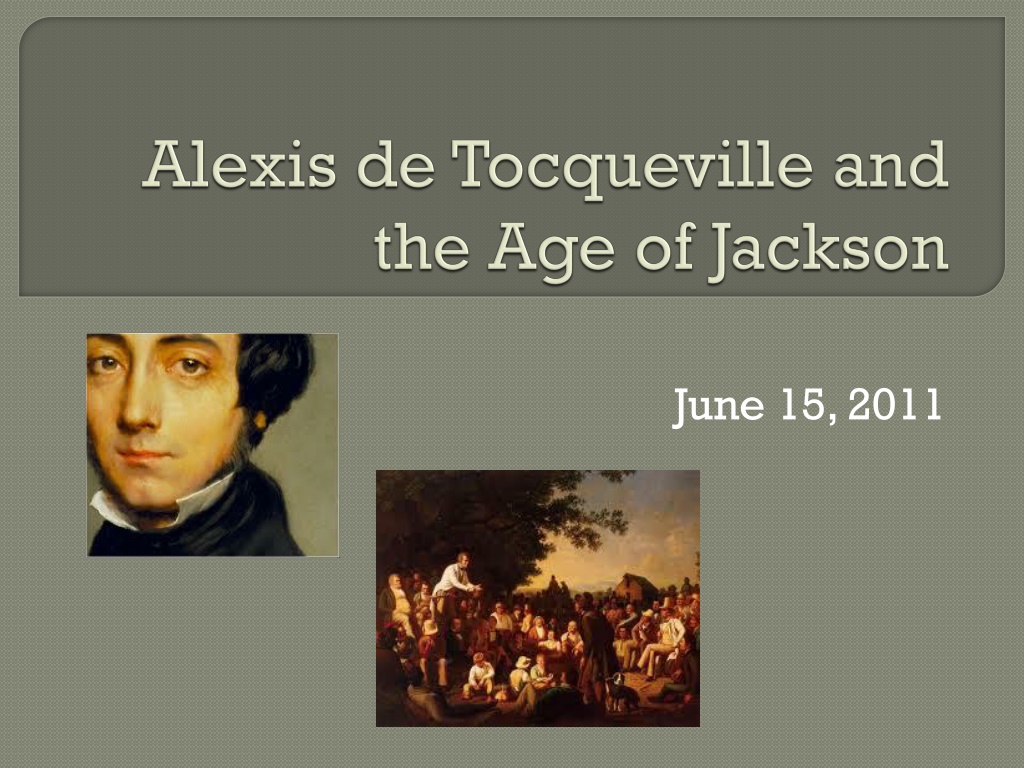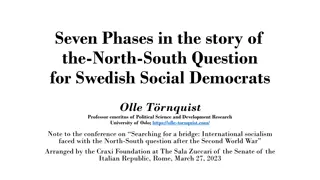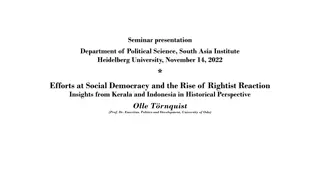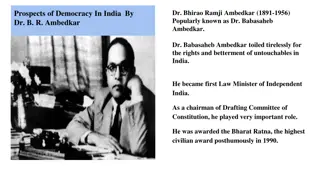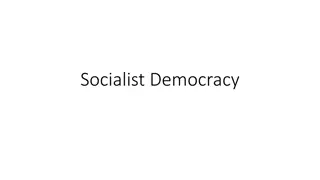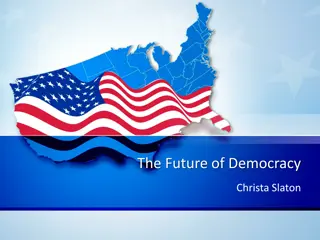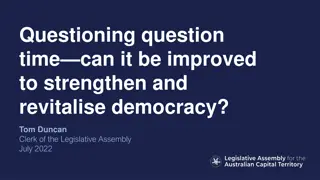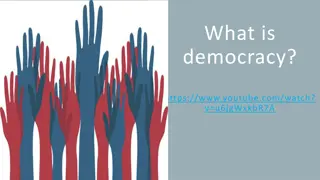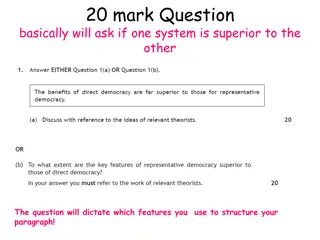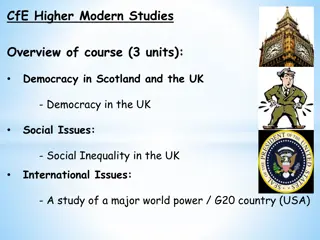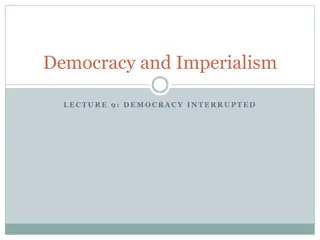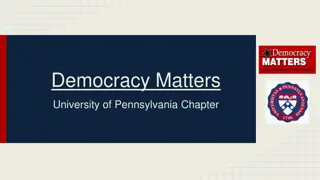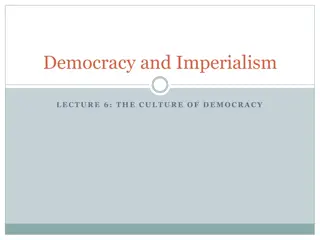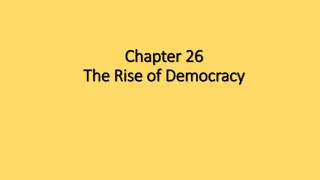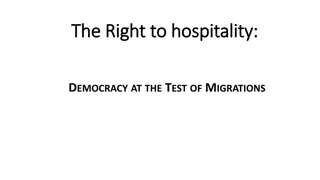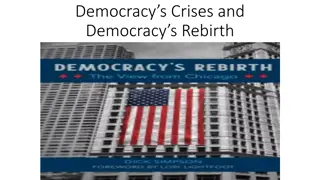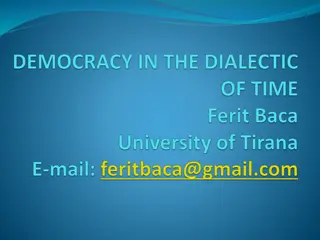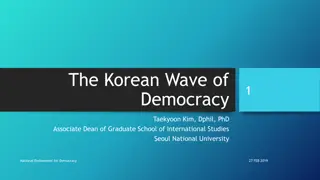Tocqueville's Insights on Democracy in America
Tocqueville's work delves into the impact of democracy on society, highlighting themes such as politics, economics, race, and religion. His observations underscore the need to guide democracy, instill beliefs, and adapt government to the people's circumstances. The text reflects a deep contemplation on societal transformation and the challenges of governance in the face of relentless change.
Download Presentation

Please find below an Image/Link to download the presentation.
The content on the website is provided AS IS for your information and personal use only. It may not be sold, licensed, or shared on other websites without obtaining consent from the author.If you encounter any issues during the download, it is possible that the publisher has removed the file from their server.
You are allowed to download the files provided on this website for personal or commercial use, subject to the condition that they are used lawfully. All files are the property of their respective owners.
The content on the website is provided AS IS for your information and personal use only. It may not be sold, licensed, or shared on other websites without obtaining consent from the author.
E N D
Presentation Transcript
1) Contexts for Tocquevilles Observations 2) Discussion of Key Themes 3) Religion in the Age of Jackson 4) Conclusion: why does Tocqueville matter?
Your impressions before today? Why did he come to the U.S.
Louisiana Purchase, 1803 War of 1812 Slavery s Transformation a Southern institution by 1831 Abolitionists and Immediate Emancipation, The Liberator, 1831 Nat Turner s Slave Revolt, 1831 The Market Revolution
Transportation Travel Times Western Settlement
Whigs and Democrats, the Second Party System (1828-1850s) National Political Parties Voter Participation
Year Eligible Voter Participation 1824 25% 1828-36 56% 1840-60 78%
Andrew Jackson, Pres. 1828-1836 Jackson s Inauguration Proper Voters in the Age of Jackson
Politics Economics Race Religion
This entire work has been written under the spell of a kind of religious terror in the soul of the author, a terror produced by the sight of an irresistible revolution that has been underway for so many centuries, overcoming every obstacle, and that today is proceeding amid all the destruction it has caused .To instruct democracy, if possible, to revive its beliefs, purify its morals, regulate its movements; gradually to substitute experience for inexperience, knowledge of true interests for blind instincts; adapt government to time and place and modify it according to the circumstances of the people: of all the tasks required of the leaders of our day who govern society, these are foremost. (p. 38)
When, after a careful examination of American history, we study its political and social condition closely, we are left with a deep conviction of one truth: that there is not an opinion, a custom, a law, I might even say not a single event, that cannot be easily explained by first beginnings, by the inception. Anyone who reads this book will find the key to almost the entire work. (p. 44)
The founders of New England were both ardent sectarians and enthusiastic innovators. (p. 45) The American social condition is entirely democratic. This has been its character since the birth of the colonies and it is even more so today. As I said in the preceding chapter, a high degree of equality prevailed among the emigrants who came to settle on the coast of New England. (p. 46)
God Almighty, in his most holy and wise providence, hath so disposed of the condition of mankind, as in all times some must be rich, some poor, some high and eminent in power and dignity, others mean and in subjection. John Winthrop, Model of Christian Charity, 1630.
The absolute sovereignty of the majority is the essence of democratic government; in a democracy, nothing outside the majority is capable of mounting resistance to it Under the Old Regime, French people believed the king was infallible .Americans have that same view of the majority .Thus, the majority s actual power in the United States is enormous once the majority has formed its opinion on any question, nothing can stop it or even block it long enough to allow time for the arguments of those who are crushed in the process to be heard. The consequences of this state of affairs are deeply troubling and dangerous for the future.
At your tables, complete the following exercise: 1) Explain a theme or observation you found important or interesting in Democracy in America. 2) Mark one or two passages that illustrate this theme. 3) Discuss how you might teach this theme to your students. [Please have one person write down your group s responses]
